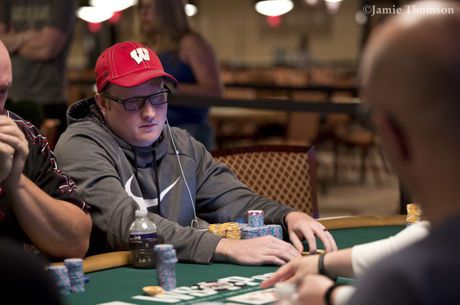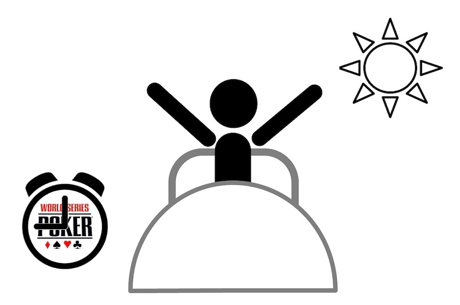Two Case Studies: Poker and Mental Health

Table Of Contents
Life can present many challenges, and mental health has never been more important or prominent in the public consciousness. Processing difficult things like grief, depression and anxiety can be a struggle.
Poker players are no different, experiencing many of the same difficulties as everyone else. But does poker help or hurt a person's mental state?
Two players who have thought long and hard about the effects that poker can have on the psyche are Ben Wilinofsky and Arron Fletcher. PokerNews explored the topic by speaking to both.
Ben Wilinofsky
Ben Wilinofsky was a winning player online before triumphing in the European Poker Tour Berlin Season 7 Main Event for $1,174,143 — his first ever Hendon Mob-tracked event. Having suffered from anxiety and depression, the man known on Twitter as @NeverScaredB admits that his name on the social media site is to project fearlessness. He understands that poker comes with a degree of mental exertion that is beyond most activities in life.
"Poker stress is unnatural," Wilinofksy says. "Everyone I know who plays high stakes is gray in their 30s."
Wilinofksy doesn't put that stress down to playing poker alone. For him, poker was a form of escapism. It started with his grandfather teaching him chess as a young boy, then in later years he transferred to Magic: The Gathering.
When he found poker, he rocketed to fortune and fame.
"Poker was special," he says. "I could sink endless hours into it, hours during which my brain was too preoccupied to spin its wheels on self-loathing and worry. Poker was something to retreat to."
With poker, even while winning, came stress. Every life has stress in it, but Wilinofsky recognized that the tension he felt playing poker was different. Even people with stressful regular jobs, he realized, usually aren't dealing with the sort of swings a poker player experiences.

Poker is a game of highs and lows, not just in financial terms, but in the emotional sense. From the unnatural high of winning a live tournament to the low caused by losing game after game on a downswing, poker pushes people to limits they're not used to in regular life.
"I find myself in a lot of situations where I am carrying unhealthy amounts of tension, particularly in live poker, where so much of what we have to do is keep control of our emotions," Wilinofsky says.
Some would argue this is a benefit reaped by poker players. After all, who wouldn't want better emotional control and the ability to separate one's mood from outside influences?
Wilinofsky, however, questions the effects of this kind of mental discipline and what it's doing to him and his fellow poker players. Not only mentally, but physically as well.
"I don't think that kind of suppression is healthy," he says. "I've also found myself deep in a live satellite, and with a chip lead on Day 2 of the WCOOP $5K event, and both times I was under an incredible amount of stress."
"I was shaking uncontrollably in the WCOOP. In the satellite, I was grinding my teeth and everything in my body was squeezed tight."
Wilinofsky says he's aware of what the effects are now and how it will affect him. Still, it can be a very difficult stress to manage.
"I find, when I fall back into playing poker, I sleep poorly," he explains. "I'm more irritable... little things get on my nerves more."
Such an experience isn't limited to poker. Recently, elite sports stars have come out about situations that have affected them, with Arsenal's former center back Per Mertesacker about a stomach ailment linked to nervous tension.
"I think the emotional swings, which lead to hormonal swings, are not something human beings are designed to sustain," Wilinofsky says. "Burying myself in poker as a distraction was a way to ignore the things bothering me. It maybe wasn't a healthy way to deal with those things.
"I just kicked the can down the road and let [those problems] fester and continue to hurt, like a thorn in my side. Not paying attention to the thorn feels better than paying attention to it. But it doesn't help you get it out."
For Wilinofsky, putting off the self-loathing and worry felt better than feeling it, but it took him further away from healing the mechanisms that caused those feelings. It was only once he faced them that he learned to separate emotion from poker.
Arron Fletcher
One player who has found poker to provide a pillar of emotional support is Arron Fletcher.
The British player has won over half a million dollars in live tournaments, including a WSOP Circuit Main Event. Fletcher is a cash game professional most of the time. He's also an emotional person, which many infer to be a bad thing when it comes to playing the game of poker.
"I have always struggled with controlling my emotions," Fletcher says.
It started when Fletcher was nine years old and his mother died. Fletcher turned to computer games as a distraction, using them to focus attention away from his feelings. He was raised by his father and his grandparents and had an extra special relationship with his "nan."
After spending eighteen months in Australia in his early twenties, he returned home to devastation.
"I lost the closest person to me," he recounts. "My nan unexpectedly died. This was the most emotionally testing time of my life. I struggled to get out of bed, not leaving my house for weeks."

Feeling unstable, struggling with grief and with limited work choices, Fletcher decided to invest all of his time in playing poker, studying and playing the game as much as he could.
"I would absolutely discourage anyone from attempting this," he says. "Poker is psychologically tough. My entitlement was at an all-time high and I was extremely emotionally fragile. I was unable to deal with disappointments and bad beats as well as you need to."
"Despite this, I was obsessed and spent all of my time playing."
Tilt was a huge problem for Fletcher. Emotions were an issue. Fletcher knew he needed to change from using poker as merely a distraction. He was aware that he was playing to keep occupied rather than dealing with the problem.
Eventually, Fletcher met a man who would turn out to become a lifelong friend: Frank Bastow, a business owner, recreational player, and passionate positivity advocate. He's also a self-help book author of Don't Be A Cant: A Manual for Happiness.
"He kindly took the time to show me what I could do with a better mentality, what was holding me back, and what I could do to improve my situation," Fletcher says. "I met him at a crucial time in my life."
Fletcher felt armed with new information and was using it to improve everything.
"I started to reduce negative emotion and became calm, rational and methodical in my approach," he says. "I stopped using poker as something to distract me from the pain of the loss of my mother and grandmother and started to play as an occupation."
Fletcher later began coaching and hypnotherapy with legendary therapist Elliot Roe. He credits him with a huge amount of assistance, and he's even turning around and trying to help others apply those same principles.
"[Roe] has helped me tremendously," Fletcher says. "This is the first time in my life I would face my emotional problems instead of distracting myself. Now I take time to coach and invest in other people, particularly in the mental game aspect of poker, which I struggled with for many years."
Being able to strip down the emotion from his game play helped Fletcher achieve peace with his past, and he learned a lot in life while spending time at the felt. For Wilinofsky, poker was an outlet that exacerbated some of his worst tendencies, something he had to overcome in order to keep having success.
Both men became their better selves in some part thanks to the changes poker made to their lives. In a world where escapism is part of aspiration, poker continues to offer some people who have issues away from the table tools to work through them on and off the felt, thereby helping them become healthier versions of themselves in the process.





